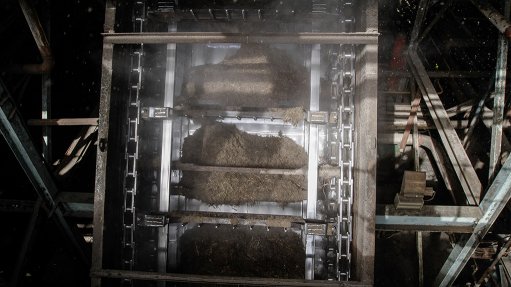
FILM THICKNESS
Plascon ensures that the dry film thickness of the coating meets client requirements, with a full inspection conducted after the application
Photo by: Bloomberg
Coatings manufacturer Kansai Plascon has reaffirmed its position in the sugar industry by providing holistic coating solutions that will prolong inevitable corrosion at sugar mills and refineries through implementing established specifications and seasoned systems.
Kansai Plascon industrial and protective coatings brand manager Mareta le Roux tells Engineering News that the company has been involved in sugar mills and refineries since the early 1990s, while working hand in hand with the producers – who have their own specifications regarding the mild steel machinery used at mills – has enabled Plascon technical specialists to provide optimal specifications for the micro and macro environments within the operating areas most likely to corrode.
The Krugersdorp-based company supplies anticorrosion solutions to sugar millers and refiners across Southern Africa countries, such as Malawi, Mozambique and Zambia, as well as the R12-billion South African sugar industry.
Le Roux notes that the complete process of implementing anticorrosion on machinery is as important as its milling the sugar. She states that evaluating the conditions remains the first and most important step in determining which solutions should be used to slow corrosion.
“We ensure that a Plascon technical specialist visits the site with the in-house engineer of the sugar company to establish what the coating requirements are. We take into account the life expectancy of the machinery, what needs to be coated and the budget of the mill.
“Most mills use mild steel machinery; we, therefore, test and evaluate our new specifications regarding the composite the company uses and incorporate them according to the requirements.”
Le Roux notes that it has been especially important to establish a network of trusted contractors who are used to applying appropriate coatings to several of the external components in the sugar mill. These include piping, floors, structural steel and the outside of tanks, as well as minor operations such as the mill’s handrails.
Contractors are subjected to a tender process during which their methods are evaluated. Plascon accreditation is subsequently awarded, should the work be of a high quality, she adds.
“Several contractors in the industry are approved by Plascon and when a tender is assigned, we still remain part of the labour process, as we check all the processes involved where our products are applied.”
This includes ensuring that the surface preparation such as abrasive blasting has been completed correctly before the company monitors how the primer is applied, Le Roux states.
Plascon also ensures that the dry film thickness of the coating meets the client’s requirements, with a full inspection conducted after the application. The company also provides a report regarding the work completed to the sugar producer after all the prerequisites have been met, she notes.
Moreover, Le Roux mentions that Plascon protective coatings products for mild steel systems, such as the epoxy-based surface tolerant primer, epoxy intermediate and polyurethane topcoats, including micaceous iron-ore types, to reduce the permeability of the coating system, have been tested in adverse conditions.
The durability of the Plascon products have, for example, been tested at a sugar mill, near the beach on the South Coast of KwaZulu-Natal, where the mill has to deal with corrosion caused by daily operations and sea spray.
The mill uses Plascotuff 3000 – a two-component, high-build and -solids surface tolerant epoxy coating – for a variety of substrates that include lightly corroded, hand and mechanically prepared, abrasive blast-cleaned and hydro blasted steel. It also uses Plascothane 9000 Tint, a dual-pack polyurethane acrylic enamel used on mild steel machinery.
While the persisting drought adversely affects the sugar industry, Le Roux states that maintenance cycles at sugar mills have been maintained.
“Sugar millers are attentive to the fact that maintenance cycles have to be sustained, as they can lose assets if they are not adhered to. Plascon is only really effected when plants are closed.”